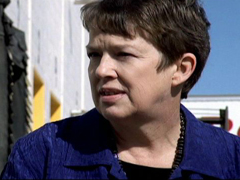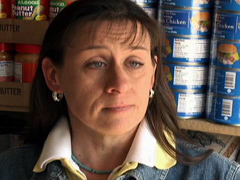In This Episode << SLIDE LEFT TO SEE ADDITIONAL SEGMENTS
Food Banks and the Recession
BOB ABERNETHY, anchor: Among the recession’s many victims, perhaps none have been more painfully hurt than those who find themselves not only out of work and perhaps homeless, but hungry as well. Money from the federal government’s stimulus package will help, but for now, in spite of generous volunteers, food banks say they’re almost overwhelmed. Lucky Severson reports.
UNIDENTIFIED NUN (making announcement on the PA at a day center): Attention in the shelter. We are now ready to serve breakfast. Families with children at the beginning of the line.
LUCKY SEVERSON: What Americans don’t want to hear right now is more bad news, but it should come as no surprise that so many of our neighbors and fellow citizens — more than one in 10 of us — are either experiencing hunger or staring it in the face.
SHANNON: We’re getting ready to sell the house because we’re going to be going into foreclosure.
SEVERSON: People like Shannon and Erin simply can’t hang on any longer.
ERIN: Our payments are going up. Every six months they keep going up, and we don’t make enough to cover the mortgage and all the other necessities — you know, electric, gas, food.
SEVERSON: If not for churches and charities manning the food banks and mobile pantries, many more would be hungry. If not for friendly volunteers, the ordeal of asking for a handout would be even more demeaning.
This is the Roadrunner Food Bank in Albuquerque, which is funded almost exclusively from private and corporate donations, from companies like Costco for instance. The food goes from here to over 600 outlets throughout New Mexico, the majority of them faith-based. It’s an impressive operation. Roadrunner is a member of Feeding America, formerly known as Second Harvest, the country’s largest hunger relief agency. Melody Wattenbarger is Roadrunner’s executive director.
MELODY WATTENBARGER (Executive Director, Roadrunner Food Bank, Albuquerque, NM): Food banks are sort of like the canaries in the mineshaft. We’ve been saying for a long time that things were not going well — that families were struggling. The frustrating part is that the need has been going up 30 or 40 percent, and I said yesterday now we don’t need canaries in the mineshaft anymore. Everybody knows. Everybody knows how bad it is.
SEVERSON: Feeding America gives food assistance to over 25 million Americans. Nine million are kids; three million, seniors. The nonprofit supplies over 200 food banks in every state that, in turn, distribute to food pantries like this one in Riverhead, Long Island managed by the Long Island Council of Churches. Reverend Tom Goodhue is executive director, and he’s not happy.
Reverend TOM GOODHUE (Executive Director, Long Island Council of Churches): We’re more and more feeding people now who are employed fulltime and can’t make ends meet. It makes me angry. I got to tell you, to see hardworking people who are still employed full time and are doing the best they can and can’t make ends meet really, really makes me mad.
SEVERSON: In New York City, nearly two-thirds of the food agencies haven’t had enough supply to meet the demand. Joel Berg is the executive director of the New York City Coalition Against Hunger.
JOEL BERG (Executive Director, New York City Coalition Against Hunger): If things had gone in the last few years from bad to worse, the last year things have really gone from worse to worser. That’s horrible English, but that really describes what’s happening.
SEVERSON: A recent survey by Feed America found that three out of four food pantries nationwide are faced with rationing food. This small outlet north of Albuquerque called People Helping People has had to close its doors on occasion. This is Chris Hoyle:
(to Ms. Hoyle): And you’re really under siege right now, aren’t you?
CHRIS HOYLE (People Helping People): Yes, we are. Yes, we’re struggling right now without finances.
SEVERSON: Because?
Ms. HOYLE: Because our donations are down and our numbers are extremely high.
LINDA STEVENSON (People Helping People): We are probably looking at about 50, 60 families — new families — a month.
Ms. HOYLE: Yes, we’re seeing a lot of people who have never come, and they’re just in need now. They’ve hit at a place in their life when they’ve been laid off, they’re in between jobs, and they simply need food.
SEVERSON: People we’ve spoken with who feed the poor say this hard time stands above all others they can remember because of how deep it reaches and how widespread it is. They say an increasing number of people who were once donors themselves are now coming in for help, and they say that churches and charities can no longer feed all the Americans struggling with hunger.
The hunger situation in New Mexico is even worse than other parts of the country. Here, one in six adults can’t put enough food on the table. One in four kids are hungry.
Ms. WATTENBARGER: Almost half of the people being served by our mobile pantries are children. What we think is happening is that people are able to swallow their pride when their children are involved, and if there weren’t children, they likely would just make do in some kind of way.
SEVERSON: Many feel that they are forgotten victims of circumstances beyond their control. Some are angry but they don‘t quite know who to blame.
Ms. STEVENSON: There are people making paychecks that are absolutely ridiculous, and there are people that are hungry. How do they sleep with their conscience? How do they do that? Obviously they — I’d love to invite them here, see what the real world is like.
SEVERSON: One of the biggest increases in demand comes from folks on fixed incomes, like Betty Orwick, a long-time volunteer.
BETTY ORWICK: Fixed income — Social Security goes just so far. Food prices are way up.
SEVERSON: Has that been one of the big problems—that food prices have gone up so much?
Ms. ORWICK: Yes sir, yes sir, and I speak for a neighbor of mine. They decide whether or not they should get food or whether they have to get their medicine. That’s hard.
Ms. WATTENBARGER: My heart really goes out to people on fixed incomes, because there isn’t anything they can do. They have so much pride, and they just will almost never seek help.
SEVERSON: Near downtown Albuquerque, the St. Martin’s day center and soup kitchen feeds about 400 people a day. Many of the clients here are chronically homeless. As many as three out of four have a mental or physical illness. These are not the people who lost jobs in the suburbs from huge chains like Circuit City and Linens ’n Things. Most here lost minimum-wage jobs in places like fast food establishments. Some, like Lindsay Work, can’t go back to work until they get medical care, which is way beyond their means.
LINDSAY WORK: I was a security officer for about the last 17 years, and I had a massive seizure working security at the state fair, and after that I just lost everything.
SEVERSON: Now he and his wife are sleeping in shelters.
Mr. WORK: You got to make the choice of either food, rent, or bills. You know, whatever gets — keeps you safe, and right now it’s the thing of food. You’ve got to put food in your stomach.
SEVERSON: Linda Woods Fuller is the director at St. Martin’s, up against lagging donations and vastly increasing need.
LINDA WOODS FULLER (Director, St. Martin’s Hospitality Center): We help with the near poor. You know, we don’t just say homeless, because the near poor is that population that is steadily increasing.
SEVERSON: Here’s the good news: People are less oblivious to the misery around them. They’re helping more.
Rev. GOODHUE: One of the great things that I think is happening in this recession is the people are much quicker to see that their neighbors are in the same boat that they are in. So there’s been really a huge outpouring of generosity from people saying, “I want to make sure my neighbors don’t starve.”
SEVERSON: And some pastors report that more people are going to church and volunteering in food pantries like this one sponsored by the Evangelical Church of Philadelphia in Albuquerque. Pastor Joe Romero:
Pastor JOE ROMERO (Church of Philadelphia, Albuquerque, NM): Every time there’s a crisis and it seems like it’s desperate — and it’s always at the end of the rope — and when people feel they’re at the end of the rope they start turning towards God, you know.
SEVERSON: The bad news is that the need is so great, all the churches and charities put together can’t feed all the hungry.
Mr. BERG: Saying that we can end hunger with a few canned food drives—a problem that impacts 36.2 million Americans, a population larger than the state of California—just isn’t true. The only way to make a serious difference in actually reversing the trend of growing hunger in America is for the federal government to once again play the leading role, which I am thankfully able to say under the Obama administration it’s actually starting to do.
SEVERSON: Berg says hunger costs the U.S. $90 billion a year in medical costs and lost productivity. A few years ago, the Department of Agriculture devised a new measurement called the Food Insecurity Index. In New Mexico, it’s 16 percent. Melody Wattenbarger doesn’t like the term. She says maybe if we called it what it is, we would treat it more seriously.
WATTENBARGER: It is a cruel circumstance for people, and to call it other than what it really is — it’s people skipping meals, children going without food. It’s hunger.
SEVERSON: According to Feeding America, the president’s stimulus package will add $20 billion to help relieve hunger among America’s families. It’s by far the largest increase of its kind in history. This means a family of four on average should receive an additional $80 a month in food assistance for the next three years.
For RELIGION & ETHICS NEWSWEEKLY, I’m Lucky Severson in Albuquerque.




